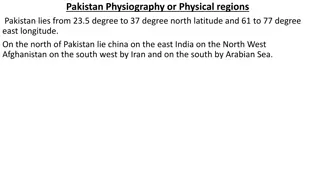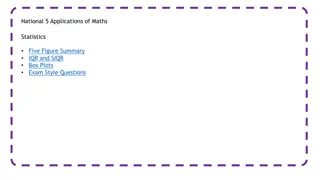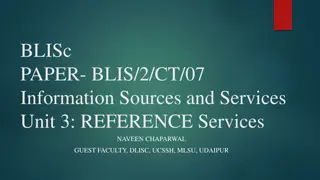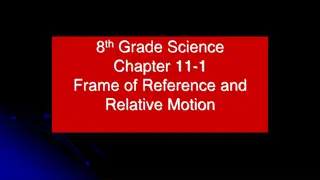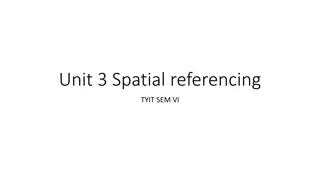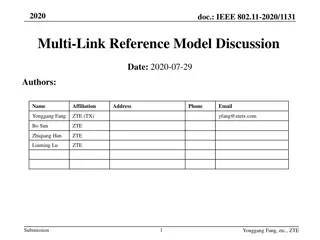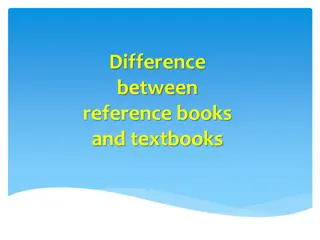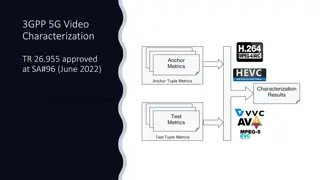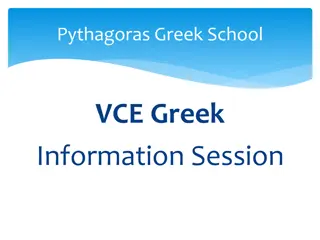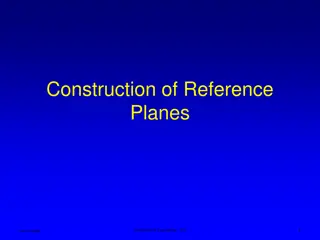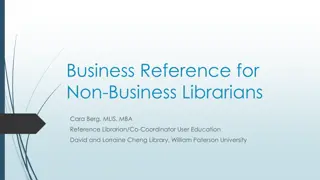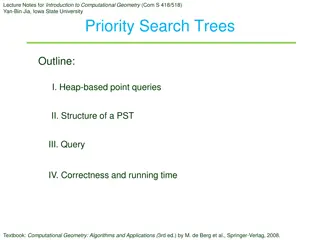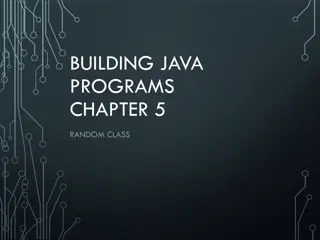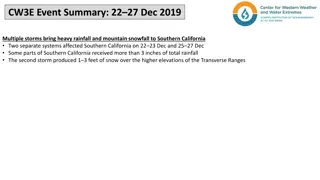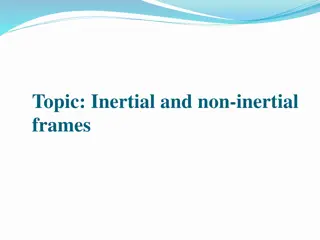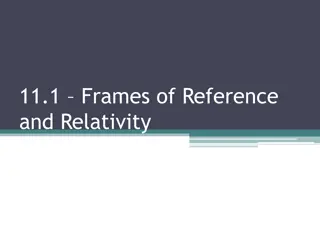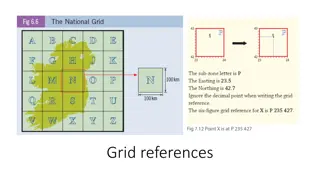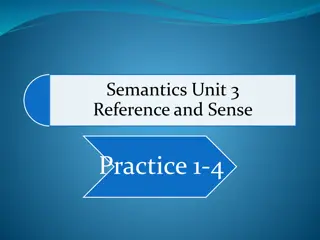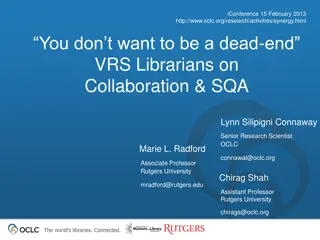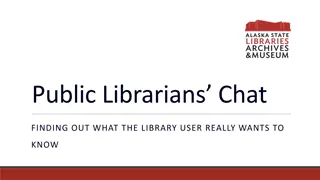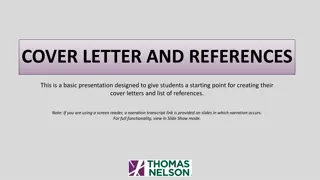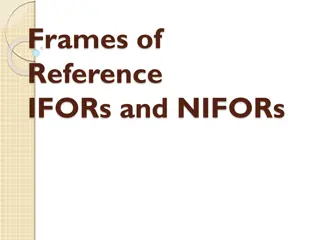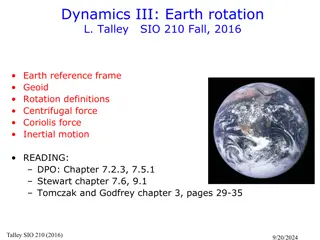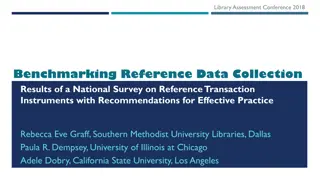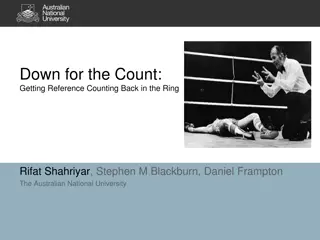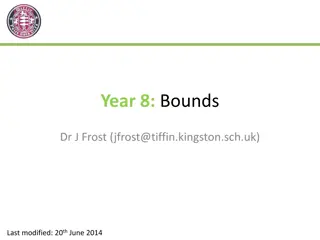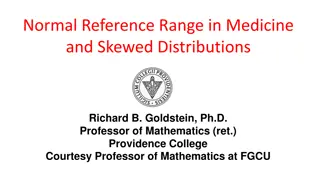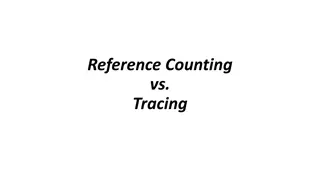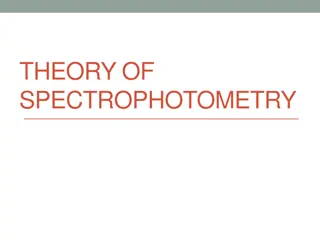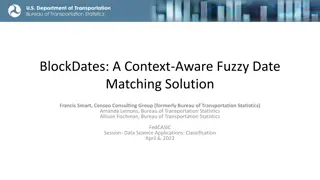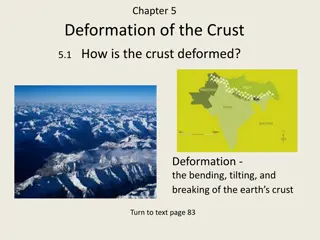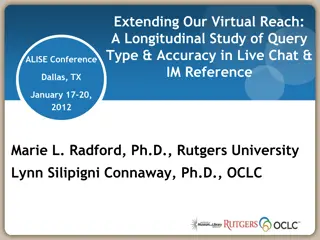Understanding Motion: Distance, Displacement, and Frames of Reference
This educational content delves into the concepts of motion, specifically distance, displacement, and frames of reference. It distinguishes between distance traveled and displacement, illustrating with examples of car journeys and runner movements. The importance of frames of reference in accurately
0 views • 45 slides
Physiography and Physical Regions of Pakistan
Pakistan's physiography spans diverse physical regions, including mountains, plains, plateaus, and deserts. The country is bordered by China, India, Afghanistan, Iran, and the Arabian Sea. Key mountain ranges include the Himalayas, Karakoram Mountains, and the Hindu Kush. Pakistan's total area is 79
1 views • 13 slides
National 5 Applications of Maths: Statistics Examples and IQR
In this educational material, you will find examples of constructing Five Figure Summaries, calculating Inter-Quartile Ranges (IQR), and Semi-Interquartile Ranges (SIQR). The content provides detailed instructions and visual aids to help you understand and apply these statistical concepts effectivel
0 views • 14 slides
Importance of Reference Services in Libraries
Reference services in libraries play a crucial role in connecting users with the information they need, promoting the use of library collections. This service assists users in various queries and requests, ranging from simple fact-finding to complex research. Reference functions include responsive s
1 views • 19 slides
Understanding Motion: Frames of Reference and Relative Motion
Motion is defined as a change in position over time. To describe motion accurately, one needs to understand frames of reference and relative motion. Frames of reference are systems of objects used to determine if something is in motion, while relative motion involves movement in relation to a refere
3 views • 14 slides
Understanding Spatial Referencing Systems for Mapping
Spatial reference systems play a crucial role in defining geographic parameters and coordinate systems for mapping. They consist of components like orientation, latitude, longitude, and elevation, which help in representing spatial properties on maps. Reference surfaces such as the Geoid and ellipso
3 views • 13 slides
IEEE 802.11-2020 Multi-Link Reference Model Discussion
This contribution discusses the reference model to support multi-link operation in IEEE 802.11be and proposes architecture reference models to support multi-link devices. It covers aspects such as baseline architecture reference models, logical entities in different layers, Multi-Link Device (MLD) f
1 views • 19 slides
Understanding Comprehensive Blood Chemistries and Reference Ranges
Comprehensive blood chemistries provide detailed insights into various elements within the body, allowing for a deeper understanding of health conditions. Reference ranges play a crucial role in interpreting these results, highlighting the importance of considering individual factors in analysis. By
0 views • 44 slides
Understanding the Varied Roles of Reference Books and Textbooks
Reference books and textbooks serve distinct purposes in education. Reference books contain specialized information like encyclopedias, dictionaries, etc., while textbooks provide structured instruction for various subjects in line with educational requirements.
0 views • 4 slides
5G Video Characterization: Reference Sequences and Metrics
Scenarios and anchor generation for various video codecs used in 5G services are detailed, along with reference sequences for different applications like Full HD streaming, 4K-TV, screen content, and more. Tools and repositories for accessing reference sequences are provided, and metrics for evaluat
0 views • 15 slides
VCE Greek Studies: Curriculum, Assessment, and Study Scores
VCE Greek Studies cover a range of themes over two years, focusing on areas such as Philosophy, Environment, Migration, and Greek Resistance. Students are assessed through tasks like writing, speaking, and reading comprehension. The study score is a reflection of a student's performance in compariso
0 views • 18 slides
Introduction to Construction of Reference Planes in Engineering
Explore the process of constructing reference planes in engineering, including principal planes, creating reference planes, reference features, and how to uniquely define a plane. Reference planes are essential for creating new sketches and carrying out feature operations in engineering design.
0 views • 12 slides
Business Reference Resources for Non-Business Librarians
Access a variety of business reference tools tailored for non-business librarians, including databases for articles on business topics, company and industry data sources, primary and secondary sources on taxation of exempt organizations, and demographic data resources. Connect with a reference libra
0 views • 7 slides
Private Dandenong Ranges Tour | Melbournechauffeursservices.com.au
Take a private tour of the Dandenong Ranges with Melbournechauffeursservices.com.au and witness the breathtaking grandeur of the area. Create unforgettable memories by booking now.
3 views • 1 slides
Introduction to Priority Search Trees in Computational Geometry
This lecture outlines the structure and query process of Priority Search Trees (PST) in computational geometry. It covers heap-based point queries, range trees for windowing queries, handling query ranges in 1D and 2D spaces, and using heaps to efficiently handle query ranges. The content discusses
1 views • 18 slides
Understanding Random Class in Java Programming
The Random class in Java is used to generate pseudo-random numbers. By utilizing methods such as nextInt and nextDouble, you can generate random integers and real numbers within specified ranges. This chapter explores common usage scenarios, such as generating random numbers between specific ranges
2 views • 10 slides
Multiple Storms Bring Heavy Rainfall and Snowfall to Southern California
Multiple storms impacted Southern California in late December 2019, bringing heavy rainfall and significant snowfall to the region. The two separate systems on December 22-23 and December 25-27 resulted in over 3 inches of total rainfall in some parts of Southern California. The second storm brought
0 views • 8 slides
Understanding Inertial and Non-Inertial Frames of Reference
Frames of reference play a crucial role in describing and observing motion. In physics, there are two main types of frames of reference: inertial and non-inertial. An inertial frame is one that moves at a constant velocity, where Newton's first law holds true. Such frames have specific characteristi
0 views • 14 slides
Understanding Frames of Reference and Relativity
Explore the concept of frames of reference in physics, distinguishing between inertial and non-inertial frames. Learn about the laws of Newtonian mechanics, guidelines for inertial frames of reference, and delve into the intriguing realm of the Special Theory of Relativity with engaging visual aids
0 views • 35 slides
Grid References and Archaeological Sites Answer Key
This content provides answers to grid references for various archaeological sites, including a four-figure grid reference and a six-figure grid reference. The images and descriptions help in understanding the locations of sites like Holy Well, Cairn, Megalithic Tomb, Standing Stone, and more. The so
0 views • 5 slides
Understanding Semantics: Reference and Sense Explained
Explore the concepts of reference and sense in semantics through examples and practice questions. Learn how language expressions refer to things in the world and understand the distinction between the referent and the reference. Delve into variable and constant reference with practical scenarios to
0 views • 8 slides
Insights on Virtual Reference Services and Collaboration in Libraries
Explore the findings from interviews with VRS librarians regarding collaboration, difficult reference encounters within and outside librarians' expertise, and the importance of sustainable collaboration between Virtual Reference and Social Q&A sites for creating new library services. The research fo
0 views • 11 slides
Enhancing Reference Services: Skills and Guidelines for Library Professionals
Explore the essence of conducting reference interviews, understanding the advantages and disadvantages, essential personal and interpersonal skills, and guidelines for behavioral performance in providing reference and information services. Delve into the remote reference service concept, the integra
0 views • 23 slides
Comprehensive Guide for Cover Letters, References, and Job Applications
This comprehensive guide provides students with a starting point for creating effective cover letters and reference lists. It includes tips on structuring cover letters, examples for reference pages, and guidance on personal and professional references. The presentation also offers contact informati
0 views • 7 slides
Understanding Reference and Inference in Linguistics
Discussing deixis, the act of reference in language is explained as a way for speakers and writers to enable listeners and readers to identify entities. Reference involves using proper nouns, phrases, pronouns, and even invented names. Inference plays a crucial role in successful acts of reference,
0 views • 11 slides
Understanding Frames of Reference in Physics
Explore the concept of Frames of Reference (IFORs and NIFORs) in physics, including laws of motion, Inertial and Non-Inertial Frames, Fictitious Forces, and examples like the accelerometer in NIFOR. Learn how these concepts help explain motion and forces in different reference frames.
0 views • 12 slides
Understanding Earth Rotation and its Reference Frame
Exploring the dynamics of Earth's rotation, this content delves into the geoid as a reference frame for pressure calculations, rotating coordinates, and the concept of centripetal and centrifugal forces. Learn about the Earth's rotating reference frame, angular velocity, and how to calculate speed a
0 views • 19 slides
Development of GR740 Single Board Computer Reference Design by RUAG Space and Partners
RUAG Space collaborates with Gaisler and other partners in the development of a GR740-based single board computer reference design funded by ESA. The project aims to create an advanced technology platform for future space projects, leveraging RUAG's expertise in electronics and digital computers for
0 views • 12 slides
ESA Validation Approach & Fiducial Reference Measurements Overview
The validation approach outlined by ESA focuses on providing reliable products with documented error bars and enhancing algorithm and sensor quality. A validation program consists of various activities, including validation against precise reference measurements, in-situ validation, inter-satellite
0 views • 8 slides
Benchmarking Reference Data Collection in Libraries: Insights from Library Assessment Conference 2018
Explore the results of a national survey on reference transaction instruments presented at the Library Assessment Conference 2018. Discover the importance of capturing reference interactions, comparing studies, and methods of data collection in libraries. Understand the changing landscape of referen
0 views • 19 slides
Reviving Reference Counting: A Comprehensive Analysis
Background garbage collection techniques like tracing and reference counting are crucial in managing memory in different settings. This article delves into the historical context, advantages, disadvantages, and challenges of reference counting in garbage collection. It presents an in-depth analysis
0 views • 35 slides
Understanding Measurement Bounds and Accuracy
Exploring the concepts of significant figures, bounds, accuracy, and ranges in measurement. From determining the smallest and largest possible lengths to finding lower and upper bounds based on accuracy, this content focuses on practical exercises and explanations to enhance understanding. Learn how
0 views • 6 slides
Enhancing Cyber Security Team Development Strategies
Explore key aspects of cyber security team development, including team structuring, core capabilities, operator development, and utilization of cyber ranges for hands-on training. Learn about the importance of operationalizing security focuses, assessing operator skills, and leveraging managed cyber
0 views • 13 slides
Understanding Normal Reference Range and Descriptive Statistics in Medicine
The concept of normal reference range in medicine, determined by collecting data from a population, helps predict intervals where values are expected to fall. Descriptive statistics like mean, variance, skewness, and kurtosis provide insights into data distributions. Methods for calculating referenc
0 views • 45 slides
Comparison of Reference Counting vs. Tracing Garbage Collection Algorithms
Understanding the differences between reference counting and tracing garbage collection algorithms, their challenges, and design spaces. Discussing topics such as storing object counts, maximum reference count distribution, overflow scenarios, and methods for maintaining counts in reference counting
0 views • 23 slides
Automotive Segment Overview and Price Reference Model
Discover automotive segment applications for safety and non-safety features with recommended products and price references. Explore temperature ranges, frequency ranges, and key applications like TPMS, engine control, ABS, and more. Gain insights into the pricing of different models in the automotiv
0 views • 4 slides
Understanding Spectrophotometry: Principles and Applications
Spectrophotometry is a valuable method for measuring the absorption of light by chemical substances, aiding in quantitative analysis in various fields such as chemistry, biochemistry, and clinical applications. This technique involves utilizing spectrophotometers to detect the intensity of light abs
0 views • 21 slides
Context-Aware Fuzzy Date Matching: BlockDates Solution
BlockDates is a tool designed to improve the extraction and interpretation of date information embedded in text narratives, particularly handling date ranges and varied formats efficiently. The tool utilizes a context-aware approach to accurately interpret single dates and date ranges, aiding organi
0 views • 17 slides
Understanding Crust Deformation: Forces, Stress, and Isostatic Adjustments
The Earth's crust undergoes various forms of deformation such as bending, tilting, and breaking due to forces like compression, tension, and shearing. Isostatic adjustments play a role in areas with mountain ranges, causing the crust to bend up and down. As mountain ranges erode, the crust lightens
0 views • 9 slides
Extending Our Virtual Reach: Longitudinal Study of Query Type & Accuracy in Live Chat & IM Reference
This study, conducted from 2004 to 2010, explores different types of virtual reference questions such as Subject Search, Ready Reference, and Procedural inquiries. It discusses the evolution of virtual reference services and the accuracy of responses in live chat and instant messaging. The research
0 views • 33 slides

